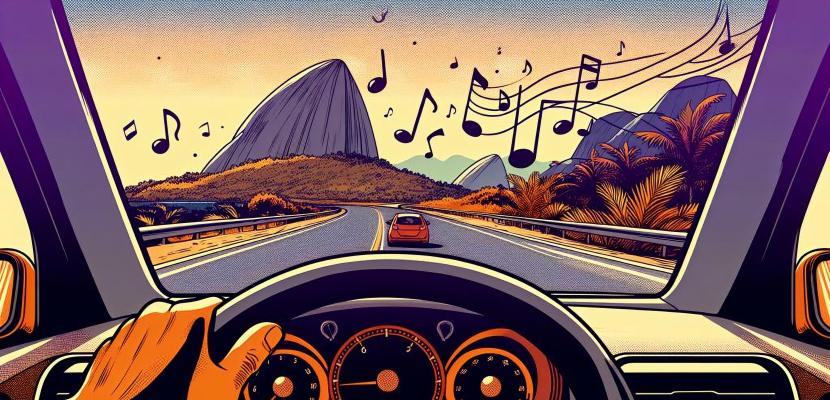
by Dr Cher McGillivray
Music soothes the savage beast, and it can also calm the angry road rager.
Research has found you should pump up the sound on some of the most calming songs on your drive, from the likes of Aerosmith, Taylor Swift, Coldplay and Elton John.
So, when you find yourself building up to a road rage outburst, try playing pop, Top 40 and country tunes to calm you.
My research identifies that listening to music, depending on the genre, is found to promote a positive mood, safer driving behaviours, a decrease in driving anxiety, increased focus (especially for teens) and, best of all, a decrease in road rage.
Listening to music of certain genres while driving is also found to promote a positive mood, safer driving behaviours, lower breathing rates, decreased driving anxiety, increased focus (except for teenagers) and a drop in road rage.
Research found fast tempo songs reduce driver fatigue but also decreases focus, increases speeding and your chance of collision.
In comparison, slow tempo songs increase the driver’s attention and focus on the road and decreases anxiety, but increases fatigue after a long period of time spent listening.
As a guide, the safest driving songs will be between 60-80 beats per minute.
Try these on your next trip and see how they impact you: I’m Yours by Jason Mraz, I Don’t Wanna Miss A Thing by Aerosmith, The Scientist by Coldplay, Eastside by Benny Blanco, Tiny Dancer by Elton John and Lover by Taylor Swift.
Despite the steady beat of your favourite songs, if you find road rage is becoming more common, you are not alone.
In a survey by the Royal Automobile Club of Queensland (RACQ), 82.6 per cent of those surveyed believed the prevalence of aggressive drivers on Queensland roads has increased year on year.
If you’re a Queensland driver, research also shows you’re more likely to be a road rager or a victim of road rage than in any other state.
One in three drivers self-reported having engaged in road rage-ish behaviour, most commonly triggered by tailgaters and distracted drivers. This means you or someone you love is probably guilty of road rage.
So why do people who are usually calm and composed fly into fits of rage when they get behind the wheel, often with dangerous consequences?
Driving angry is reliably associated with traffic crashes.
Road traffic crashes are responsible for more deaths worldwide than most diseases, and are the leading cause of death for children and young adults aged five to 29, according to the World Health Organisation (WHO).
We define road rage as hostile behaviours to other road users, including behaviours such as tailgating or colliding with a lead vehicle or forcing someone off the road.
These definitions include a wide range of behaviours, including speeding, running red lights, changing lanes without signalling, violent confrontations and even behaving angrily as a passenger.
So, what are the most common triggers of road rage? We find they include slow driving, reckless drivers, hostile or discourteous drivers, congestion, stressful events and work stressors.
For some people, external stimuli are constantly scanned for signs of potential threat, and then over-interpreted in terms of threat and disrespect, which may in part explain how this morphs into rage.
How do we respond? While everyone’s different, our physical response is that we find our heart racing, our respiration rate increases, we launch into verbal cursing, we usually honk and, on some occasions, we step outside the car and can engage in a physical fight.
There are two general effects – increased congestion caused significantly higher levels of perceived stress and aggressive behaviours, and listening to preferred or favourite music lowered levels of stress, but only when drivers perceived no urgency.
Heavy metal fans typically drive more frequently while drunk, more frequently above 140kmh, and more frequently without a seat belt.
Interestingly, participants who listened to either happy or sad music had significantly fewer driving errors than those who did not listen to any music at all.
Interestingly, while drivers listening to heavy metal, house/dance, hip-hop, rap and hard rock recounted aggressive driving most often, they also conveyed that when they listen to songs with lyrics of a neutral content, the incidence of aggressive driving was roughly one in five (20 per cent).
Soothing melodies or instrumental music can help you stay calm and focused behind the wheel, along with audiobooks.
Here are some tips for the driver, passenger and anyone who is trapped inside a vehicle by a road rage driver.
● Don’t take another driver’s actions personally
● Listen to music that you love to improve your mood
● Breathe slowly and deeply to calm down
● Count from one to 10 before you react emotionally to the situation
● Focus on getting to your destination and seeing your loved ones
Dr Cher McGillivray is an Assistant Professor at Bond University and registered clinical psychologist.